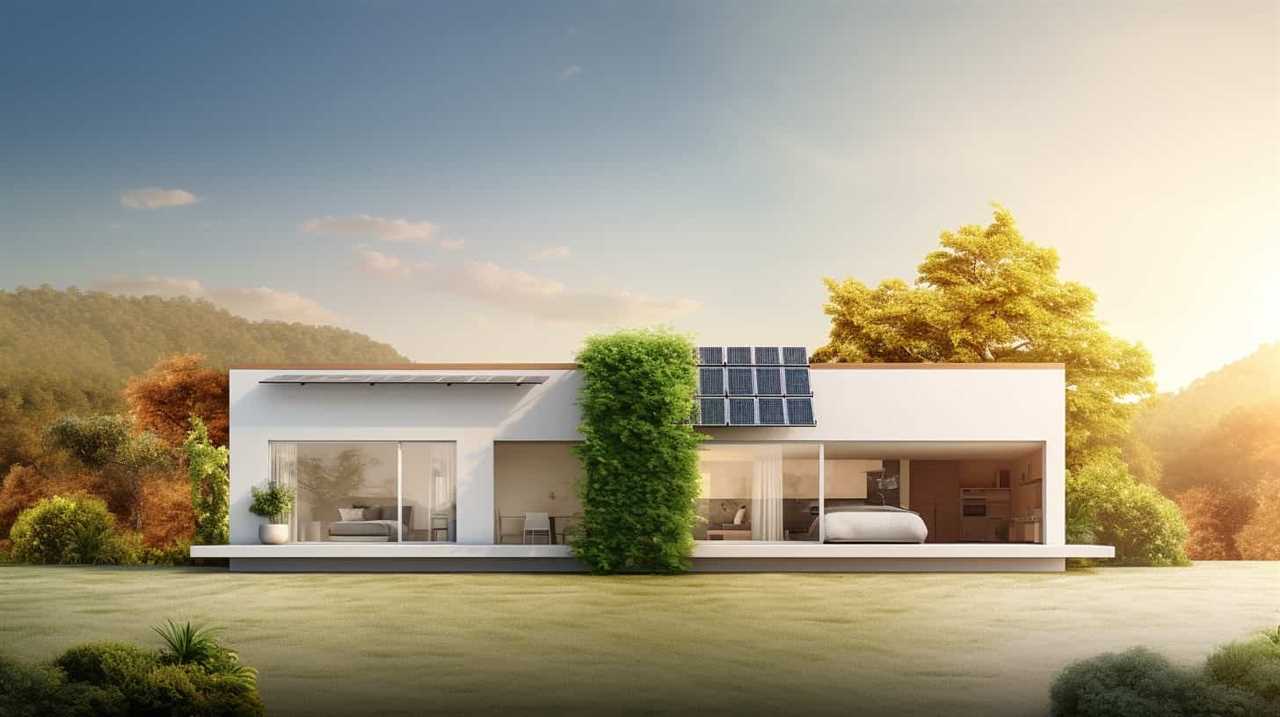We are excited to introduce a revolutionary product: energy-efficient heat pumps for residential HVAC systems. These advanced devices provide a new level of comfort while also helping to lower energy usage.
With a focus on eco-friendly solutions, we’ll explore the basics, energy efficiency ratings, key features, and maintenance tips for these advanced heat pumps.
Join us on this liberating journey towards a greener and more efficient home. Let’s revolutionize our HVAC systems and embrace a sustainable future together.
Key Takeaways
- Heat pumps provide both heating and cooling capabilities for residential HVAC systems.
- SEER and HSPF ratings measure the energy efficiency of heat pumps.
- Energy-efficient heat pumps reduce electricity consumption and greenhouse gas emissions.
- Proper sizing, regular maintenance, and care are essential for maximizing performance and longevity of energy-efficient heat pumps.
The Basics of Heat Pumps in Residential HVAC Systems
Let’s start by understanding the three basic components of heat pumps in residential HVAC systems.

Heat pumps are energy-efficient devices that provide both heating and cooling for homes. They consist of an outdoor unit, an indoor unit, and a refrigerant.
The outdoor unit contains a compressor, a condenser coil, and a fan. It extracts heat from the outside air during winter and releases it inside the home. In summer, it extracts heat from the indoor air and releases it outside.
The refrigerant, such as R-410A or R-32, is a crucial component that facilitates the heat transfer process. However, refrigerant leaks can occur, causing a decrease in efficiency.
Common problems with residential heat pumps include inadequate heating or cooling, frozen coils, and unusual noises. Troubleshooting these issues involves checking electrical connections, cleaning or replacing filters, and inspecting the refrigerant levels.

Understanding the Energy Efficiency Rating of Heat Pumps
We can assess the energy efficiency of heat pumps by considering their Seasonal Energy Efficiency Ratio (SEER) and Heating Seasonal Performance Factor (HSPF). SEER measures the cooling efficiency of a heat pump, while HSPF measures its heating efficiency. The higher the SEER and HSPF ratings, the more energy-efficient the heat pump is.
When choosing a heat pump, it’s important to look for models with high SEER and HSPF ratings to maximize energy savings. Heat pumps offer several advantages in terms of energy efficiency. They can provide both heating and cooling, eliminating the need for separate systems. Additionally, heat pumps transfer heat instead of generating it, making them more energy-efficient than traditional heating and cooling systems.
Key Features and Benefits of Energy-Efficient Heat Pumps
One of the key benefits of energy-efficient heat pumps is that they can significantly reduce electricity consumption while providing both heating and cooling capabilities. This translates into substantial energy savings for homeowners. By using advanced technology and optimized designs, energy-efficient heat pumps are able to extract heat from the air or ground and transfer it into or out of a building with minimal energy input. This reduces the reliance on traditional heating and cooling systems, which often consume large amounts of electricity.
In addition to energy savings, energy-efficient heat pumps also have a positive environmental impact. By reducing electricity consumption, they help to decrease greenhouse gas emissions and mitigate climate change. Choosing an energy-efficient heat pump for your home can’t only save you money on your energy bills but also contribute to a greener planet.

Now, let’s move on to the next section and explore some tips for choosing the right size and capacity heat pump for your home.
Tips for Choosing the Right Size and Capacity Heat Pump for Your Home
To ensure optimal performance and efficiency, it is important to consider both the size and capacity of the heat pump when choosing one for our home. Sizing considerations involve determining the appropriate heat pump size based on the heating and cooling needs of our home. It is crucial to accurately calculate the required heating and cooling loads to avoid purchasing an undersized or oversized heat pump. Oversized units may short cycle, leading to poor efficiency and increased energy consumption, while undersized units may struggle to meet the desired temperature, resulting in discomfort.
When it comes to capacity, it refers to the amount of heating or cooling that a heat pump can provide. It is measured in British Thermal Units (BTUs) per hour. To determine the right capacity, factors such as the size of the living area, insulation levels, climate, and the number of occupants should be considered.
Consider the following table for a quick reference on important sizing considerations and installation requirements:

| Sizing Considerations | Installation Requirements |
|---|---|
| Proper load calculation | Adequate space for installation |
| Climate and weather conditions | Proper ventilation |
| Insulation levels | Electrical requirements |
| Number of occupants | Proper drainage system |
Maintenance and Care for Energy-Efficient Heat Pumps in Residential HVAC Systems
Ensuring regular maintenance and proper care are essential for maximizing the performance and longevity of energy-efficient heat pumps in residential HVAC systems. Here are some key maintenance and care tips to keep in mind:
-
Schedule regular professional maintenance: It’s important to have a qualified technician inspect and service your energy-efficient heat pump at least once a year. They can identify any potential issues and ensure optimal performance.
-
Keep the outdoor unit clean: Regularly remove debris, such as leaves and dirt, from the outdoor unit. This helps maintain proper airflow and prevents the heat pump from overworking.
-
Change air filters regularly: Dirty air filters can restrict airflow and reduce the efficiency of the heat pump. Follow the manufacturer’s recommendations for filter replacement frequency.

Frequently Asked Questions
Can Heat Pumps Be Used in Commercial HVAC Systems as Well?
Yes, heat pumps can be used in commercial HVAC systems. They offer numerous benefits such as improved energy efficiency, cost savings, and environmental friendliness. Incorporating heat pumps in commercial buildings is a smart choice.
Are There Any Government Incentives or Rebates Available for Installing Energy-Efficient Heat Pumps?
Yes, there are government incentives and rebates available for installing energy-efficient heat pumps. These incentives aim to promote the use of environmentally friendly systems and reduce energy consumption in residential buildings.
How Long Is the Typical Lifespan of an Energy-Efficient Heat Pump?
The typical lifespan of an energy-efficient heat pump depends on regular maintenance. With proper care, these systems can last for 15-20 years. Regular inspections, filter changes, and cleaning are essential for optimal performance and longevity.
Are There Any Specific Installation Requirements for Energy-Efficient Heat Pumps?
There are specific installation procedures and maintenance requirements for energy-efficient heat pumps. These include proper sizing, ductwork modifications, and regular filter cleaning. It is important to follow these guidelines for optimal performance and efficiency.

Can Energy-Efficient Heat Pumps Be Used in Conjunction With Other Heating and Cooling Systems in a Home?
Yes, energy-efficient heat pumps can be used in conjunction with other heating and cooling systems in a home. They can be integrated with renewable energy sources, such as solar panels, to further enhance their energy efficiency.
Conclusion
In conclusion, energy-efficient heat pumps are like the superheroes of residential HVAC systems. They save the day by efficiently transferring heat, resulting in lower energy consumption and utility bills.
With their impressive energy efficiency ratings and key features, these heat pumps are the perfect choice for any home. Remember to choose the right size and capacity and give them the proper maintenance they deserve.
Embrace the power of energy efficiency and let these heat pumps keep your home comfortable and your wallet happy.










